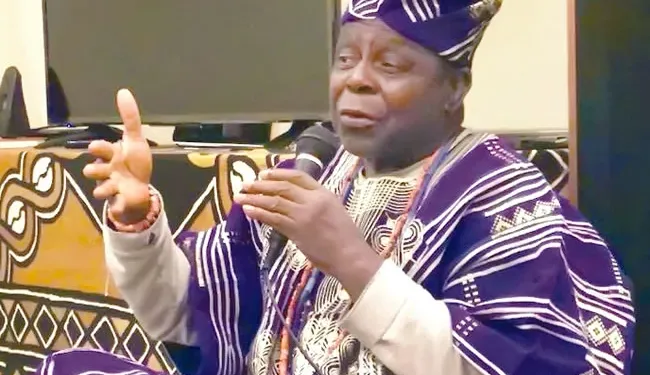In a recent impassioned statement, Chief Yemi Elebuibon, a respected figure in traditional Yoruba practices, condemned the rising tide of internet fraud in Nigeria, popularly known as “Yahoo Yahoo.” He did not mince words in his critique, asserting that those who assist fraudsters through spiritual means—such as providing charms or divination—are equally culpable.
“Yahoo boys are thieves. They take money by lying. Some of them pretend to be women, promising what they cannot deliver. It’s all a scam. The people who make charms for them are equally dubious,” Elebuibon said, speaking to News Express. His comments echoed a deep concern about how the fusion of modern internet fraud and traditional spiritual practices has worsened the situation.
The renowned traditionalist further explained that, while there is nothing inherently wrong with using divination for legitimate business purposes, when it crosses the line into aiding criminal activities, it becomes just as unethical. “There is no crime in using traditional means to boost legitimate businesses, but it becomes a crime when those who are supposed to help are aiding fraud,” Elebuibon emphasized.
Traditional Practices and Modern Scams
Elebuibon pointed to the role of diviners, or spiritual consultants, in perpetuating the fraud cycle. He explained that some internet fraudsters, referred to as “Yahoo boys,” use these services to bolster their illegal activities. However, the situation is complicated by the fact that many of the Yahoo boys do not reveal their true intentions to the diviners. “Some of these fraudsters won’t even tell the truth to the diviners, who are trying to help them. Instead, they lie about their business intentions and then go on to use the charms for evil purposes,” Elebuibon said.
His remarks brought attention to a pressing issue in Nigerian society: the role of traditional spirituality in modern criminal schemes. The blending of ancient practices with modern crime has made it difficult to distinguish between legitimate spiritual assistance and illegal manipulation. Elebuibon’s stance is clear—fraudulent activities must be denounced, no matter the source, whether it be digital scams or spiritual deception.
A Call for Stronger Law Enforcement
Echoing concerns from various sectors of Nigerian society, Elebuibon pointed out the inefficiencies within the country’s security and judicial systems, which he believes are complicit in the growing number of internet fraud cases. “Our security and judicial systems need to do more. Law enforcement must be rigorous, and those caught must face full punishment. The lack of follow-through after arrests only perpetuates the problem,” he said, adding that the failure to prosecute offenders undermines public confidence in the rule of law.
His statement is a direct critique of a system that often sees high-profile fraudsters arrested, only for their cases to be forgotten or delayed. Elebuibon’s call for accountability is not only aimed at the criminals themselves but also at the government for failing to implement strict law enforcement.
“If people see that there are consequences for their actions, they will think twice before engaging in criminal activities,” Elebuibon argued.
The Broader Societal Crisis
The renowned traditionalist didn’t stop at internet fraud. He also pointed to the broader societal issues contributing to the rise in criminal activities, particularly among Nigerian youths. According to Elebuibon, a lack of discipline, a dependence on easy money, and societal breakdown are major factors driving young people toward fraudulent activities.
“Our youth are not willing to work hard. They sit around, waste their lives, and turn to fraudulent means to make money. This is a failure of both the government and society,” Elebuibon lamented. He went on to argue that the government must do more to encourage hard work and proper job creation to deter youths from taking shortcuts in life.
Elebuibon’s statement reflects a deep frustration with the current state of affairs in Nigeria. “Every year, the government allocates funds for various sectors, but what can we point to? The money is misappropriated, and nothing tangible is done. Our youth are misled by the belief that they can make easy money and get away with it,” he added.
Government’s Role in Addressing Youth Unemployment
While Elebuibon was vocal about the role of traditionalists and fraudsters, he also expressed concern over the lack of government support for industries like agriculture, which could offer more employment opportunities. “The government has to refocus its efforts on agriculture and provide the necessary support to create jobs. No matter what the minimum wage is, if we continue to neglect agriculture, things won’t improve,” he said.
He argued that with inflation soaring and the cost of living becoming unaffordable for many Nigerians, it is more critical than ever to return to agriculture as a means of stabilizing the economy. “The high cost of food is a result of neglecting farming. Until we return to the farm, the situation will remain the same,” Elebuibon said.
Accountability and the Path to Change
In his final remarks, Elebuibon called for a shift in the cultural mindset of Nigerians. He criticized a system where politicians and leaders take credit for public works, even when their efforts are largely symbolic. He used the example of politicians who dig boreholes and invite the public to celebrate them, calling it a deception. “We deceive ourselves by praising politicians for the little they do. People gather in matching clothes to sing their praises for digging a borehole. This is the kind of mindset we need to change,” he said.
Elebuibon’s words are a stark reminder of the importance of accountability at all levels of society—from the government to individuals. He urged Nigerians to take responsibility for their own actions and demand better leadership. “If we hold our leaders accountable and stop expecting handouts, only then will we see the change we desire,” he concluded.

